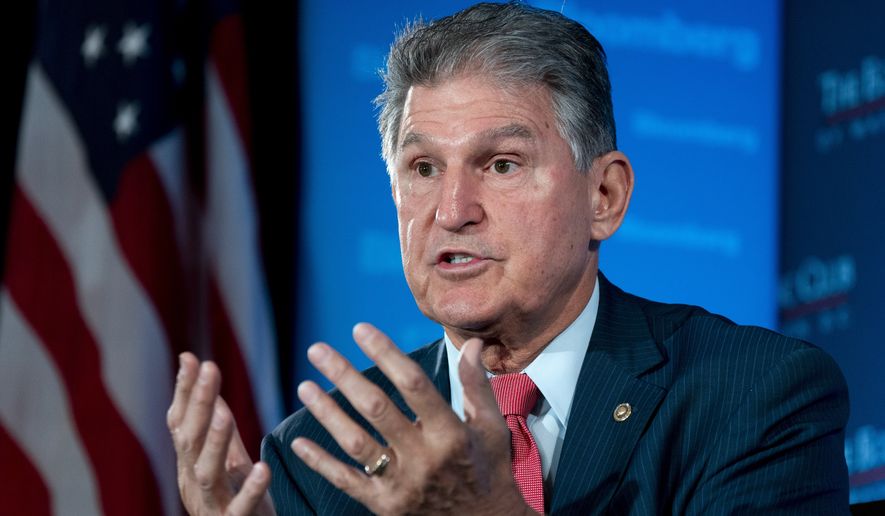Widespread disagreement among Democrats over Medicare expansion and combating climate change is threatening to wreck two of President Biden’s top domestic priorities: the $1.2 trillion bipartisan infrastructure bill and a partisan expansion of the federal safety net.
The long-simmering divisions between moderate and far-left Democrats flared up Tuesday as lawmakers rushed to finalize an agreement on Mr. Biden’s roughly $2 trillion social welfare bill.
While progress has been made in cutting the bill down from $3.5 trillion, Democrats are inextricably stuck on how to deal with climate change and Medicare expansion.
And with Democrats planning to push the measure through Congress along party lines using budget reconciliation, a process allowing spending measures to pass the 50-50 Senate by a simple majority, Mr. Biden cannot afford any disunity.
Senate Budget Committee Chairman Bernard Sanders, a democratic socialist from Vermont, has said that the final product must lower the cost of prescription drugs and expand Medicare to cover vision, dental and hearing care to be acceptable.
“Bottom line is that any reconciliation bill must include serious negotiations [between] Medicare and the pharmaceutical industry … and a serious reconciliation bill must include expanding Medicare to cover dental, hearing aids and vision,” he said. “That’s what the American people want.”
Moderate Democrats in the House and Senate are opposed to such ambitious overhauls of the nation’s health care system.
Sen. Joe Manchin III, a West Virginia Democrat and key swing vote for the deal, has argued that expanding Medicare would be inappropriate given the program already faces fiscal challenges.
“You’ve got to stabilize [Medicare] first before you look at basically expansion,” said Mr. Manchin. “So if we’re not being fiscally responsible, that’s a concern.”
Another moderate Democrat, Sen. Kyrsten Sinema of Arizona, has similarly raised concerns about Mr. Sanders’ push to let Medicare negotiate the price of prescription drugs. Ms. Sinema, along with several House Democrats, opposes the measure, saying it will devastate innovation in the pharmaceutical industry.
Likewise, there are also disagreements over how to address climate change within the bill. Progressives say that without a strong climate change component the reconciliation bill will be useless.
“Tens of millions will be displaced due to the climate crisis if we don’t act boldly now,” said Rep. Pramila Jayapal, a Washington Democrat who chairs the 98-member Congressional Progressive Caucus. “This is the crisis of our lifetime.”
Mr. Manchin, the chairman of the Senate Energy Committee, has signaled his opposition to a key tax-credit plan Mr. Biden was hoping to implement. The program would have forced electric utility companies to abandon coal and natural gas in favor of wind and solar.
With that policy dead, Democrats scrambled for a “robust” alternative to tackling climate change. At the moment, the most likely alternative is a fee on methane, a short-lived but potent greenhouse gas that is the primary component in natural gas.
The fee, which Republicans say would cause home heating bills to skyrocket, drew significant skepticism from Mr. Manchin and other moderate Democrats from states with strong energy economies.
“You can’t use things as a hammer,” said Mr. Manchin. “You’ve got to give an incentive to do the right thing. … Methane pricing done wrong is very detrimental, it won’t happen.”
Democrats hope that by tailoring the methane fee to serve as more of an “incentive” than a tax, they will get Mr. Manchin and others on board.
The likelihood of success remains low, however. But the pressure to try has only increased as Mr. Biden prepares to attend the United Nations Climate Change Conference in Scotland next week.
Administration allies say Mr. Biden wanted to arrive at the summit with a major climate policy in place to showcase Washington’s commitment to combating global warming.
White House National Security Adviser Jake Sullivan on Tuesday downplayed the importance of getting an agreement this week.
“I don’t think that world leaders will look at this as a binary issue: Is it done? Is it not done?” said Mr. Sullivan. “They’ll say, ‘Is President Biden on track to deliver what he said he’s going to deliver?’ We believe one way or another he’s on track to do that.”
Complicating matters are far-left Democrats who demand an agreement on reconciliation before the House votes on the $1.2 trillion infrastructure bill. Progressives fear that without the leverage of the infrastructure bill, moderates won’t support the bigger bill.
House Speaker Nancy Pelosi, a California Democrat, initially hoped to pass the infrastructure deal this week before Mr. Biden departed for his overseas trip. To do so, she said, the reconciliation framework had to be finalized.
Progressives say that without the full text of the spending bill, which could take weeks to produce provided there is an agreement, they have no incentive to vote for the infrastructure deal.
“You don’t really know everything that’s in there until the text is drafted,” said Ms. Jayapal.
• Haris Alic can be reached at halic@washingtontimes.com.




Please read our comment policy before commenting.